Is Uganda failing its senior citizens?
According to Global Age watch index 2015, Uganda is one of the worst countries for the elderly to live
Nabukiisa, 86, crashing stones in Nakalanga village Mbale district. According to Help Age International, more than 90% of the elderly in Uganda have no option but to continue with often physically demanding, strenuous and low-paying work. Photo John Masaba
POVERTY| CORRUPTION|ELDERLY
As life expectancy improves in Uganda, the aging population is on the increase. However, with a broken pension system and lack of a mechanism where the State can take care of vulnerable older persons, the elderly are being left to fend for themselves. John Masaba writes about the dilemma of growing old in Uganda.
He reckons he was born in 1923. That makes him 94 years old, an incredible feat in a Uganda, where average life expectancy is just 60 years.
But despite this blessing of a long life, Daudi Maganda did not like my compliments about his long life. It makes a mockery of the life he is leading, he says.
"Mwaana wange nsaba Kibumba antwale mpone okudhaaga," he said, implying: My son pray instead that God takes me to the next world to get a break from this misery.
At his age, Maganda still seeks work for pay from neighbours to get a day's meal!
"If you have your garden, I can do some weeding," said the resident of Butende-Buleri village, about 6km from Kamuli Town.
However, it is looking likely that Maganda's will to soldier on is finally giving way.
"Sometimes my legs get paralysed and I can hardly stand up in the morning," he said. With no children of his own, Maganda is now living each day at the mercy of strangers and often times he goes without food.
"When you do not have your people, you live like a dog," he says.
But Maganda is not alone in his predicament. There are thousands of Uganda's 1.4 million elderly people living that way.
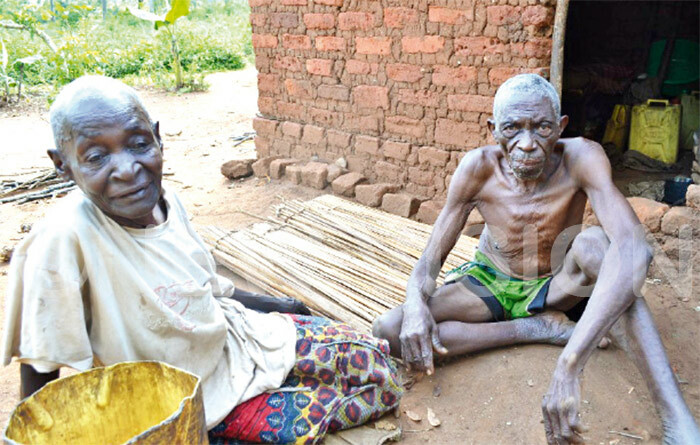 Maganda with his wife at their home in Kamuli. The 94-year-old now survives on charity as he has no one to fend for him
Maganda with his wife at their home in Kamuli. The 94-year-old now survives on charity as he has no one to fend for him
According to a survey by Chronic Poverty Advisory Network (CPAN) conducted in 2013, 4.7% elderly people moved out of poverty, while a bigger number, 4.9%, slipped into poverty. Titled The second Chronic Poverty Report - Uganda Is Anybody Listening? The report revealed that the percentage of elderly slipping into poverty had increased by more than one percentage point (up from 3.7% in 2005 to 4.3% in 2013).
The report blamed the state of affairs on Uganda's poor pension system — where only 11% of Ugandans have access to pension. It also said the HIV/AIDS pandemic that hit the country in the 1990s, had left thousands of orphans in its wake for the elderly to look after.
Help Age International says as a result, more than 90% of the elderly in Uganda have no option but to continue with often physically demanding, strenuous and low-paying work well into old age.
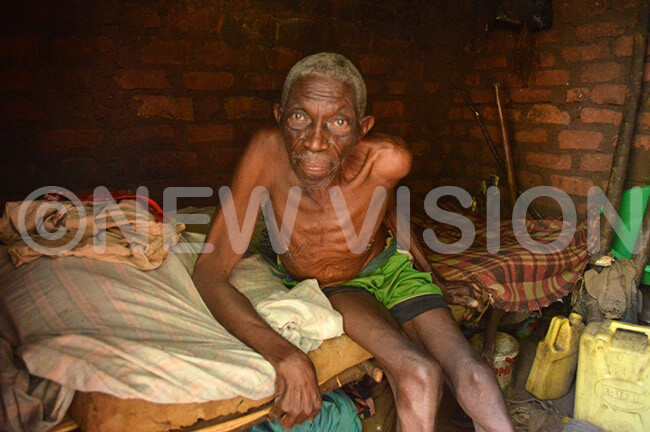 Maganda lives in appalling conditions at his home in Butende-Buleri Kamuli district
Maganda lives in appalling conditions at his home in Butende-Buleri Kamuli district
It is upon such background that President Yoweri Museveni in 2011 declared a special fund for the elderly, resulting in the birth of SAGE, also known as Social Assistance Grants for Empowerment. Under the programme, older persons over 65 (60 for Karamoja sub-region) receive a cash transfer of sh25,000 monthly.
Launching the programme, the Government projected the intervention had the potential to reduce the national poverty rate by 16%.
According to the National Policy for Older Persons (NPOP) 2009, upon which SAGE was derived, giving older persons a cash transfer was in tandem with a UN global campaign that urged countries to dedicate a significant slice of their budgets for programmes that target the elderly. The campaign is in a bid not only to aid the elderly to age in dignity — but to also help them continue participating in the economic development of their countries. This is a sensible intervention as world demographic pyramid bulges at the top.
The United Nations Population Fund says world population of older persons will by 2050, for the fi rst time in history, be greater than the population of children under 14 years.
Half of them (elders) will be in the developing countries, including Uganda. Justifying support for the elderly, NPOP noted: "The majority of older persons live in rural areas where poverty is rife, economic opportunities are limited, ill-health is common and health services are inadequate.
They work in the agricultural sector, which is characterized by fl uctuations in produce prices, irregular income and low returns to labour. About 85% of the active older persons are engaged in crop farming with no social security, rendering them totally vulnerable. Their economic situation worsened by the burden of looking after orphans and other vulnerable children left by the youth who have succumbed to the HIV/ AIDS pandemic."
Possible Corruption?
From dubious payments, where some beneficiaries are drawing up to eight times more than what they are entitled to, sham selections where bona fi de older persons are deliberately knocked off the beneficiary list, an investigation by Saturday Vision has revealed that the programme is riddled with multiple irregularities — in breach of a memorandum of understanding (MOU) between the Government and donors. A source has told Saturday Vision that this could result in donors walking out on the programme.
 Mukoda's payment slip
Mukoda's payment slip
Inflated payments
Kamuli district, for example, was enrolled on SAGE programme in the 2015/2016 financial year. According to guidelines from the Expanding Social Protection (ESP), a benefi ciary's pay is counted from that date of registration. As such Annet Mukoda, 70, and Mary Babirye, 76, from Busoigo zone, Kamuli municipality, were entitled to five months arrears from December 6, 2016 until April, 2017 when they were eventually paid.
On account of that, Mukoda and Babirye was entitled to sh125,000 as arrears upon getting their first payments. However, Instead Mukoda was paid sh275,000, while Babirye pocketed sh300,000. This means that the duos' arrears were inflated to 11 and 14 months respectively, instead of five.
It was not possible to establish how widespread this problem was by press time.
However, one district councillor in Kamuli told Saturday Vision on condition of anonymity: "The selection (of beneficiaries) was influenced by politics. If you are keen, you will realize that a number of them (beneficiaries) are close relatives to local leaders. It is possible some leaders are helping their people. In Uganda everything is possible."
This could be the reason why bona fide beneficiaries such Daudi Maganda lost out despite being needier and more vulnerable.
"They told us we would be alerted to receive our cash," Maganda's wife Sirisita, who herself was not eligible for SAGE because she had no national ID, said.
However, the couple would later learn that his (Maganda's) name was missing when fellow elderly people in district started getting their cash last year.
Maganda's national ID indicates he was born on May 28, 1923. And he is from Kiyauunjwa sub-county n Kamuli, a benefi ciary district.
According to a resolution passed by Parliament in 2015/2016 budget process, beneficiaries on SAGE should be the 100 oldest people in each sub-county. When contacted, an ESP official denied Maganda was deliberately knocked off the list of Kamuli beneficiaries and explained that his (Maganda's) ID might be forged!
 Post Bank bullion van delivering cash to the elderly in Kamuli district. The bank replaced MTN following a corruption scandal involving payments of SAGE cash in 2015
Post Bank bullion van delivering cash to the elderly in Kamuli district. The bank replaced MTN following a corruption scandal involving payments of SAGE cash in 2015
Donors threaten
The findings come at a time government is struggling to raise funds to meet its counterpart funding obligations for the SAGE programme, as stipulated in a memorandum of understanding with donors. A lion's share of the programme's funding comes from a grant to
Uganda from UK's Department for International Development (DFID) (£57,137,101), and Irish government (£10,625,000), making a total of £6.7m (about 247.3b).
According to the MOU, the Government committed to provide sh9b, sh17.59b, sh29.15b, sh40.34b and sh52.92b between FY2015/16 and 2019 /20. However, in the fi nancial year 2015/16, only sh5.6b was released instead of the sh9b. In 2016/17, by the end of the 4th quarter only sh13.7b of the planned sh17.59b were released, angering donors and resulting in them withholding payment for 2016/2017 financial year.
In a correspondence with the Government, the head of DFID office in Uganda, Jennie Barugh and the Irish Ambassador, Donal Cronin wrote: "I am writing to inform you of our decision to extend the Expanding Social Protection Programme-Phase Two inception period from January 31, 2017 to July 2017. As a result, we propose to delay the movement of the programme into full implementation phase in order to give us time to reappraise the agreement that we have with the Government of Uganda."
A source at ESP told Saturday Vision that the donors have since then resumed funding to the programme — despite the Government ‘marginally improving in its performance'.
"They are paying, but are keeping an eye on the Government (allocations to SAGE programme)," the source said.
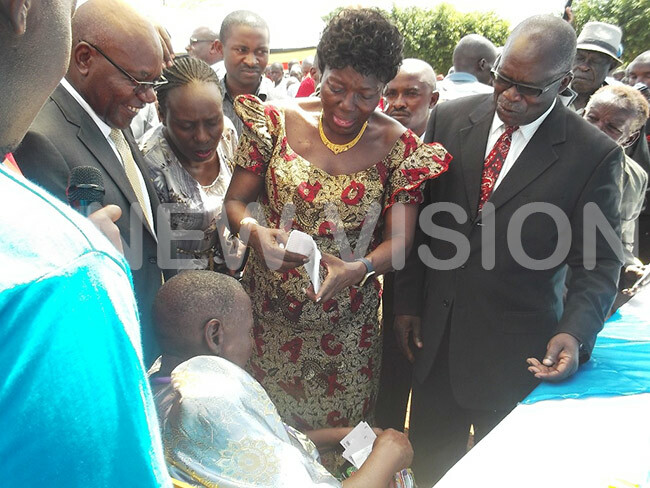 Speaker of Parliament Rebecca Kadaga launching SAGE programme in Kamuli district
Speaker of Parliament Rebecca Kadaga launching SAGE programme in Kamuli district
Districts turn heat on ESP
Saturday Vision has learnt that five districts; Kaliro, Kayunga, Kyotera, Namutumba and Rakai have petitioned Sylvia Nabatanzi Muwebwa, the Equal Opportunities Commission (EOC) chairperson, to investigate SAGE for possible corruption.
The petition was submitted by Initiative for Social and Economic Rights (ISER), a local NGO, on behalf of the districts.
"We have orphaned grandchildren, our children died of HIV/AIDS. Our grandchildren are failing to go to school due to lack of tuition and the Government is arresting us for not taking them to school." Alice Basalirwa, a widow from Kaliro, said in the petition.
Another petitioner, Margaret Waiswa from Namutumba, said she last received the money on December 31, 2016. She said she had hope that EOC can help them access these funds more frequently.
Charles, 70, said: "They come and announced that SAGE funds are being distributed.
However only three people are given the funds while the rest are left to queue, despite their frail condition." The money is given to those who are not needy, yet widows and widowers are ignored.
ISER is concerned about an imbalance in distribution of SAGE cash across districts. "Out of the 40 districts that are benefi ting from the senior citizens grant, coverage for six districts was below 10% i.e. Kayunga (5%), Kamuli (6%), Bugiri (7%), Mayuge (8%), Amuru (8%) and Kitgum (9%)," she notes.
"On the other hand, 11 districts recorded a coverage of 81% and above as of 30th June 2017. These are: Kyenjojo (81%), Nebbi (81%), Moroto (83%), Kyankwanzi (83%), Kole (83%), Kaberamaido (86%), Zombo (91%), Katakwi (92%), Kibaale (92%), Kiboga (94%) and Amudat (127%)." This, ISER, says contravenes the constitution.
A source told Saturday Vision that there would ‘be more noise' had 10 district out of 47 implementing SAGE not been managed directly by donors. The source said most of the ‘lucky' districts are in Karamoja region. "Unlike funds from the Government which delay for up to four months, donors ensure that theirs is in every two months," the source added, explaining that because of the strict monitoring, cases of messing with the older persons cash is unheard of.
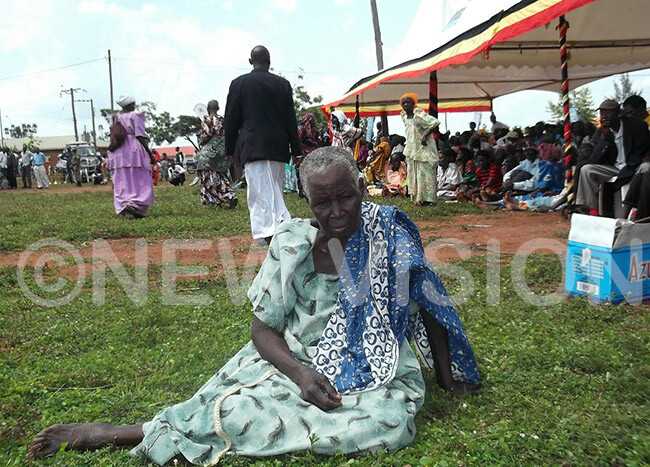 One of the elders who turned up during the launch of SAGE
One of the elders who turned up during the launch of SAGE
ESP officials react
An official at ESP admitted the project had lost ‘some' money. But explained that it was earlier in 2014 and that they have now put in place stringent measures to secure programme's funds.
"The culprits are now in court," said ESP communication advisor, Simon Omoding, in reference to a Kole district incident, where funds totaling sh400m and meant for 8,000 beneficiaries was stolen. "But I can assure you that we have not failed to pay anyone (because of the scandal)."
Omoding could not, however, explain the source of funds to pay the affected beneficiaries after the funds were stolen.
A source said as a result, the SAGE technical officer, monitoring and evaluation officer and the system information officer, were fired. ESP also dropped MTN mobile money as its service provider, replacing it with Post Bank.
About the Kamuli discrepancies, Omoding denied inflating payments. "When our team visits to make payments and somebody is either sick or unable to pick their money for some reason, what do you do?" he said. He added that because the money is little some beneficiaries prefer not to pick the money so they can take it when it accumulates.
The issue of why arrears of some beneficiaries were larger than the period the said beneficiaries had been enrolled could not be explained. Saturday Vision has also learnt that Post Bank does not pay interest on the SAGE beneficiaries' savings or undrawn balances. We have also learnt from a source at Post Bank that the accounts of SAGE beneficiaries are only used to receive SAGE grants and no beneficiaries can deposit money from other sources. So what would have made the monies to swell?
It, therefore, means the money may have been deliberately deposited in those beneficiaries' accounts either by omission or by commission and government could have lost colossal sums of money as a result.
During the investigation, Saturday Vision was able to come across 10 payment slips with inflated arrears, which confirms the fact that problem may be wide spread.
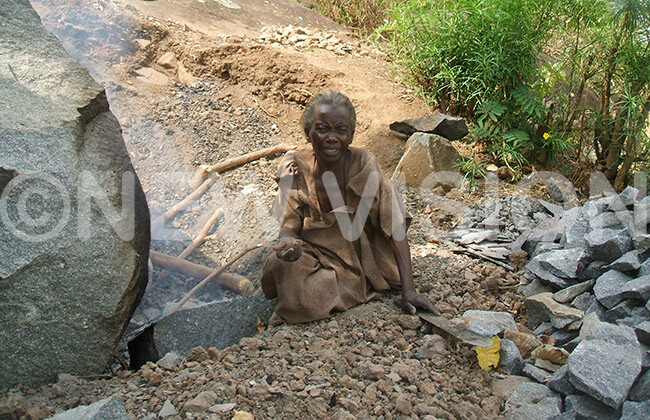
An elderly lady working a stone quarry in Mbale district
Reforms needed
Julius Kapwepwe Mishambi, director of programmes at Uganda Debt Network, a civil society organisation which monitors how the Government utilizes borrowed funds, says current problems are symptomatic of failure by the Government to reform the pension sector. David Munyangabo, 75, who is the deputy chairperson of Kigezi Elder's Forum, which champions the rights of the elderly in western Uganda, agrees.
"We used to be paid on every 15th of the month but now it is 4th and we have not been paid. The elderly are very vulnerable people and do not need to go through this," Munyangabo said last month, adding that some of his members had been taken off the pension pay roll without any explanation.
Mishambi referenced an ongoing standoff between the Government and the Internal Security Organisation ex-servicemen as a pointer that urgent reforms are needed in the pension sector.
 Julius Kapwepwe Mishambi
Julius Kapwepwe MishambiHe said embarking on SAGE programme alone — even if it were to be funded well — would not help the situation. This is because as it captures only a minute section of Uganda's 1.4 million needy senior citizens.
As well as reforming the pension sector, Mishambi said, effort should be made to address the problem of failure by government to provide counterpart funding and rein in corruption in donor funded projects.
"It is a big problem across MDLs (ministries, departments, agencies and local government)," he said. The consequence of the above, he said, was the underperformance of many projects, resulting in a decline in service delivery.
He added that the national debt has ballooned to near unmanageable levels because the Government has failed to put in place solid mechanisms to monitor donor-funded programmes and bring to book those who misappropriate funds allocated. "This is an unwarranted cost to the tax payer," he said.
Worst country for the elderly
According to Global AgeWatch Index 2015, Uganda is one of the worst countries for the elderly to live. The index places Uganda among the nine countries in the world at the bottom of the index, where Switzerland and Norway are number one and two respectively.
Other countries at the bottom include Pakistan and West Bank (Palestine). In 88th place on the log, Uganda is, however, better than Zambia and Rwanda.
According to the index, countries with better rankings were those vibrant pension systems, access to health facilities as well as the general enabling environment for the elderly like transport, civic freedom and social connection. These are then aggregated to give the final score, which determined a country's position on the log.
Help Age International urges governments not to look at elderly as a burden but as an opportunity to be harnessed. Referencing Japan — which after facing growing numbers of elderly versus it working population, in the 1960s adopted a comprehensive welfare policy, introduced universal healthcare, a universal social pension and a plan for income redistribution, low unemployment and progressive taxation.
"This investment (by Japan) has paid off with a healthier labour force and increased longevity. As a result, Japan is not just the oldest, but also one of the healthiest and wealthiest countries in the world," says the report in its recommendations.
Although Kenya is not any better, its rankings are expected to rise after it this month rolled out a universal pension scheme for all its senior citizens. Semiautonomous Zanzibar became the first in East Africa with a fully state-funded universal pension last April.
RELATED TO THE STORY